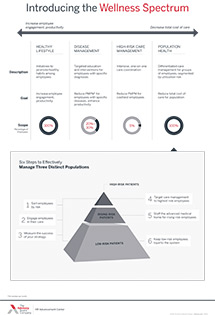Auto logout in seconds.
Continue LogoutNurses are responsible for the health of others, but often the demands of the job force their own health to take a back seat—a finding that prompted the Medical University of South Carolina to launch a pilot program to bring new food to the hospital cafeteria, Maria Castellucci writes for Modern Healthcare's "Transformation Hub."
Nurses less healthy than the general population
According to Rachel Nusbaumer, a nurse at MUSC, it's easy for nurses to slip into poor eating habits "if you don't plan, especially if you're tired and busy." She added, "You're going to eat whatever to fill you up."
This was reflected in the American Nursing Association's (ANA)'s 2016 Health Risk Appraisal, which found that just 16% of nurses ate five or more servings of fruit or vegetables each day, and just 35% ate three or more whole grain servings. The survey also found the average body mass index of respondents was 27.6, which falls in the "overweight" category. Finally, the survey found that only 56% of nurses reported access to healthy foods such as fruits, vegetables, or whole grains during their work hours
MUSC's initiative
To help nurses eat more healthfully, MUSC partnered with ANA and Sodexo, a hospitality company, to launch a pilot program to encourage nurses to eat healthier food, Castellucci reports.
From June to August, Sodexo stocked the hospital's cafeteria with more vegetable and fruit options, including a Korean tofu noodle salad and a Greek salad, Castellucci writes. Hospital staff also had access to healthier snacks, including hard boiled eggs and almonds, fruit cups, and celery sticks with ranch dressing.
The food was prepared fresh every day and packaged so nurses could take them to go. To help nurses keep track of what they're eating, the packages indicate how many servings of fruits or vegetables each meal contains, Castellucci writes.
To make sure word got out, MUSC promoted the new initiative during morning huddles, in newsletters, and on computer screensavers.
Andrea Coyle, the professional excellence and magnet program director at MUSC, noted that nurses make up come than a third of the MUSC's staff and providing a healthy work environment is a key part of the hospital's strategic plan. "If we keep our nurses healthy it will have a huge return on investment," she said.
Coyle said responses to the healthy eating pilot have been positive, especially among nurses working the night shift.
While the official pilot period has ended, Julie Branham, the national nutrition director for Sodexo's North America hospital segment, said the company will continue to provide its healthier menu items to MUSC. And Castellucci reports that MUSC is exploring other programs to improve nurse health, including healthier vending machine options (Castellucci, "Transformation Hub," Modern Healthcare, 9/1; ANA survey, accessed 9/6).
Upcoming webconference series: Create care standards your nurses will embrace
In these sessions, learn how to provide enterprise-wide rollout support to embed new standards and activate frontline nurses in care variation reduction.
Don't miss out on the latest Advisory Board insights
Create your free account to access 1 resource, including the latest research and webinars.
Want access without creating an account?
You have 1 free members-only resource remaining this month.
1 free members-only resources remaining
1 free members-only resources remaining
You've reached your limit of free insights
Become a member to access all of Advisory Board's resources, events, and experts
Never miss out on the latest innovative health care content tailored to you.
Benefits include:
You've reached your limit of free insights
Become a member to access all of Advisory Board's resources, events, and experts
Never miss out on the latest innovative health care content tailored to you.
Benefits include:
This content is available through your Curated Research partnership with Advisory Board. Click on ‘view this resource’ to read the full piece
Email ask@advisory.com to learn more
Click on ‘Become a Member’ to learn about the benefits of a Full-Access partnership with Advisory Board
Never miss out on the latest innovative health care content tailored to you.
Benefits Include:
This is for members only. Learn more.
Click on ‘Become a Member’ to learn about the benefits of a Full-Access partnership with Advisory Board
Never miss out on the latest innovative health care content tailored to you.


